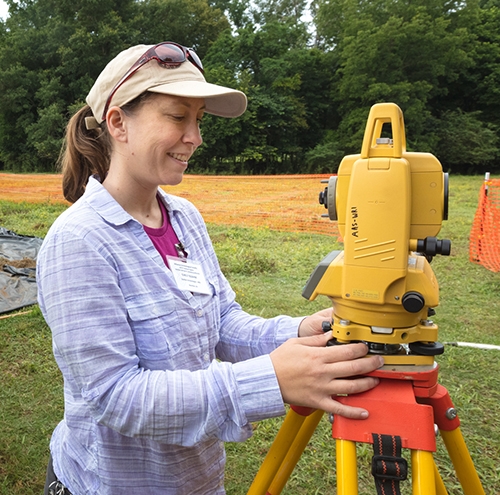FAYETTEVILLE, Ark. – Studies have demonstrated that sexual harassment occurs more frequently during field research than in a traditional classroom setting. University of Arkansas archeologists Emily Beahm and Carl Drexler will help address this problem by contributing to a multi-institutional research team awarded $300,000 by the National Science Foundation.
"As a discipline, we require students to participate in a field-based course, and we know that field work is where sexual harassment is more likely to occur," said Beahm, research station archeologist with the Arkansas Archeological Survey. "Unfortunately, our discipline has done little to understand what field directors do to prevent sexual harassment, or if they can improve current practices. This grant will enable our team to provide recommendations that can improve archeological learning."
Beahm is part of group led by Carol Colaninno, research assistant professor at the Southern Illinois University Edwardsville STEM Center and principal investigator for the project. Other team members include Drexler, research assistant professor at the University of Arkansas and station archeologist with the Arkansas Archeological Survey; and Shawn Lambert, assistant professor at Mississippi State University and research fellow at the Cobb Institute of Archaeology.
.jpg) Archeologist Carl Drexler at a Caddo mounds survey site near Lockesburg. |
Colannino said this issue plagues academic disciplines dependent on field-based research, such as biology, ecology, geology and archeology. Research has shown that students who have been historically underrepresented in science, engineering and technology — including women, minorities, LGBTQ-plus members and those with diverse abilities — have an increased likelihood of harassment compared to individuals outside these groups.
The NSF award supports research designed to prevent sexual harassment during undergraduate field-based courses. The research team will develop evidence-based practices and policies that field school directors can implement to prevent sexual harassment and make field schools safer and more inclusive for undergraduate students who aspire to become archeologists.
The researchers emphasize that sexual harassment might be one factor contributing to fewer undergraduate students among underrepresented groups in field-based sciences, technology, engineering and math, the STEM fields.
"If students, particularly those who identify with groups underrepresented in STEM, are harassed or assaulted, they may decide to leave the scientific community altogether," Drexler said. "When this occurs, science loses the diversity of intellectual thought and personal experiences that these students have brought to the field, and their potential to serve as role models and mentors to the next generation of diverse scholars."
During the three-year grant period, the researchers will conduct landscape analysis, work with field directors and students to develop recommended practices, and help implement these practices by documenting how they help create a safer and more inclusive field learning environment.
Beahm is research station archeologist at the University of Arkansas-Winthrop Rockefeller Institute Station, and Drexler serves as station archeologist at the Southern Arkansas University research station.
Field directors interested in the project, can find more information at siuestemcenter.org/safe-field-schools.
About the University of Arkansas: The University of Arkansas provides an internationally competitive education for undergraduate and graduate students in more than 200 academic programs. The university contributes new knowledge, economic development, basic and applied research, and creative activity while also providing service to academic and professional disciplines. The Carnegie Foundation classifies the University of Arkansas among fewer than 3 percent of colleges and universities in America that have the highest level of research activity. U.S. News & World Report ranks the University of Arkansas among its top American public research universities. Founded in 1871, the University of Arkansas comprises 10 colleges and schools and maintains a low student-to-faculty ratio that promotes personal attention and close mentoring.
Topics
Contacts
Emily Beahm, research station archeologist
Arkansas Archeological Survey
501-727-6250,
Carl Drexler, research assistant professor and station archeologist
Arkansas Archeological Survey
870-235-4230,
Matt McGowan, science and research communications officer
University Relations
479-575-4246,
